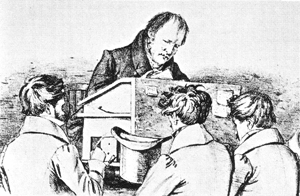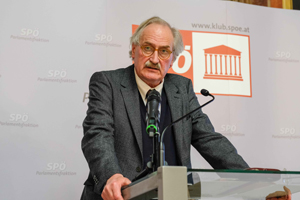
Your complimentary articles
You’ve read one of your four complimentary articles for this month.
You can read four articles free per month. To have complete access to the thousands of philosophy articles on this site, please
Books
Freedom’s Right by Axel Honneth
Peter Stone questions if it’s worthwhile trying to update Hegel’s politics without addressing his problems.
In Freedom’s Right: The Social Foundations of Democratic Life (2014), Axel Honneth, Professor of Philosophy at the University of Frankfurt and at Columbia University, offers an update to G.W.F. Hegel’s most famous work of political philosophy, the Philosophy of Right (1821). Freedom’s Right certainly represents an impressive intellectual effort: it apparently took Honneth nearly five years to complete. And I suppose one could say that Honneth has done a good job updating Hegel. But was it worth updating Hegel in the first place? Did the world really need Philosophy of Right 2.0? Personally, I am not convinced.
At the heart of the Philosophy of Right was a story about society and history. This story rested upon two claims. First, every society is governed by a set of moral principles that holds it together. Different societies have possessed very different moral codes, and understanding a society’s moral code is crucial to understanding that society. Second, there is a pattern in how moral codes change over time. Specifically, the world is coming more and more to be governed according to the demands of reason. Over time, societies with moral codes more in accord with reason supplant societies whose moral codes are less reflective of reason’s demands. So for Hegel, to understand history is to understand the process by which reason instantiates itself more and more in the moral and political systems governing the societies of the world. In the Philosophy of Right, Hegel sought to identify the moral principles that he believed could be found underlying (his) contemporary society, and which represented a particular stage in the world-historical development of reason.
Problems With Hegel’s Vision
To be sure, Hegel’s view of society and history is far from obvious. For one thing, it’s not at all clear that every society is unified by some set of moral principles. Surely there are serious, and widespread, differences of opinion – often regarding matters of life and death – within any moderately diverse society. For another, one doesn’t have to study history very long to doubt that it embodies the progressive development of reason.

Hegel lecturing by F. Kluger, 1828
Hegel was aware of these problems. He recognized, for example, just how ugly history could be: he once famously described history as a ‘slaughterhouse’. Nevertheless, Hegel and his followers believed that there were clear moral principles governing the (then) modern world. These moral principles did not perfectly govern society; as well as morality, people certainly acted on the basis of selfishness, impulse, fear, and simple stupidity. And the moral principles governing any society were themselves not perfect – they merely represented the dictates of reason as developed at that particular point in time and space. Moreover, history itself did not demonstrate a smooth process of advancement. Hegel’s theory left plenty of room for accidents, setbacks, and even catastrophes. But for Hegel the moral principles governing his society still represented a definite advance over the past, as reason marches ever onward towards its fulfilment.
Any philosopher who believes that there are moral principles underlying her own society will surely have her work cut out finding them, even if the principles really are there to find. In particular, she will have to avoid two serious potential pitfalls. On the one hand, she has to recognize that not every feature of her society is an embodiment of reason’s march through history: there’s clearly a lot of ‘white noise’ in the process. And so she must be ready to separate the wheat from the chaff: to distinguish moral principle from accident, happenstance, etc. On the other hand, she cannot dismiss too many features of society as mere accidental deviations from its coherent set of moral principles. After all, if the deviations become too great and/or too numerous, then it starts to look doubtful that any one set of principles is governing society after all. Perhaps then the philosopher is not really finding moral principles in society; perhaps she is instead simply identifying principles that sound nice to her, and then projecting them onto her own world.
Honneth’s Modern Hegelianism
In Freedom’s Right, Honneth clearly wishes to advance Hegel’s project. His focus is on modernity’s principles of justice – the moral principles regulating our society that determine who gets what, when, and how. “I sought,” Honneth writes, “to follow the model of Hegel’s Philosophy of Right and develop the principles of social justice by means of an analysis of society” (p.viii).
In principle, Honneth admits, there could be different principles at work in different spheres of social life. But in practice, in modern society, he contends, there is only one. That value is freedom: “Of all the ethical values prevailing and competing for dominance in modern society, only one has been capable of leaving a truly lasting impression on our institutional order: freedom, i.e. the autonomy of the individual” (p.15). Honneth proceeds to identify three distinct understandings of freedom: negative, reflexive, and social (Chapters 1-3). Negative freedom “consists in fulfilling any and all desires, provided they serve the subject's self-assertion” (p.22). With reflexive freedom, “individuals are free if their actions are solely guided by their own intentions” (p.29). Social freedom goes beyond this: “On this account individual subjects can perform the reflexive acts required for self-determination only if they interact socially with others who do the same” (p.42). Honneth then attempts to demonstrate how these understandings play themselves out in our contemporary social institutions, such as the family and the economy (Chapters 4-6).

Honneth lecturing
© Bruno-Kreisky Press 2016
In advancing a Hegelian understanding of society, Honneth must confront all of the challenges that confronted Hegel himself. Unfortunately, he does not meet many of these challenges any better than Hegel did. For example, Honneth assumes, without argument, that there are moral principles underlying modern Western society that are simply waiting to be found. “The aim of constructing a theory of justice as social analysis,” he writes, “depends entirely on the… premise that social reproduction hinges on a certain set of shared fundamental ideals and values” (p.3). Honneth acknowledges that we live in a world containing many different moral perspectives, but he somehow believes this doesn’t affect his argument. Rather, diversity requires society to have values that binds it together: “Even the existence of ‘heterogeneous’ societies marked by ethnic or religious diversity has little effect on this ‘transcendental’ necessity of normative integration” (p.4). So Honneth seems to take it as simply obvious that every society has a set of moral principles that hold it together – that every state has a well-defined ‘ethical life’, to use Hegel’s expression. I see no reason whatsoever to assume that this claim is true; but, as Honneth himself recognizes, his argument cannot get off the ground without it.
And Honneth claims not just that there are shared ideals holding the modern world together, but that there is only one such ideal – freedom – which holds the entire fabric of social life together. Given such a bold claim, I would expect him to spend a lot of time demonstrating that the ideal of freedom does indeed underlie all our social practices. I would also expect him to show that other ideals cannot plausibly be shown to play even a part in this role – that freedom really does stand alone in this department. Instead, in sketching out the three distinct understandings of freedom that he believes play a role in modern life (negative, reflexive, and social freedoms), Honneth simply relies upon a range of philosophers who have theorized about freedom. He does write about history later in the book (most of his examples come from literature and film, not the social sciences), but in doing so he makes little effort to demonstrate that he has indeed found the key to understanding modern social life. Rather, he simply takes for granted that freedom provides a unified account of justice in our social practices, and then sketches out a story about how it does so. Again, the skeptic will see little reason to grant Honneth his starting point, yet without it everything that comes afterwards will remain unconvincing.
Complicating matters further is the fact that Honneth is prepared to discard certain features of Hegel’s philosophy, in particular, Hegel’s assumption that history necessarily embodies progress, at least in the long term. For “given the experience of a ‘breach of civilization’, e.g., the realization of the possibility of a holocaust within civilized countries, we can no longer share Hegel’s optimism that modern societies follow a continuous path of rational development” (pp.2-3). But if history does not present us with the spectacle of reason continually progressing its self-realisation, why then believe that our current society must involve some form of instantiation of rational principles? Why can’t human history just be a lot of sound and fury, signifying nothing? Honneth never even considers the possibility.
If you want to see where Hegelian philosophy has gone since Hegel, you will want to read Freedom’s Right. It certainly represents the state of the art in the field. But if you want to be convinced that Hegelian philosophy is an enterprise worth undertaking, you will receive little help from Freedom’s Right. Whether you get anything out of Honneth’s book will thus largely depend upon whether you think Hegelian philosophy is worth doing at all. Regardless of the answer to that question, Honneth does seem to be doing it well.
© Peter Stone 2017
Peter Stone is an assistant professor of political science at Trinity College Dublin. With Tim Madigan he co-edited Bertrand Russell: Public Intellectual (2016), which won the 2017 Bertrand Russell Society Book Award.
• Freedom’s Right: The Social Foundations of Democratic Life, by Axel Honneth, Polity Press, 2014. 412 pages, ISBN 978-0-231162470









